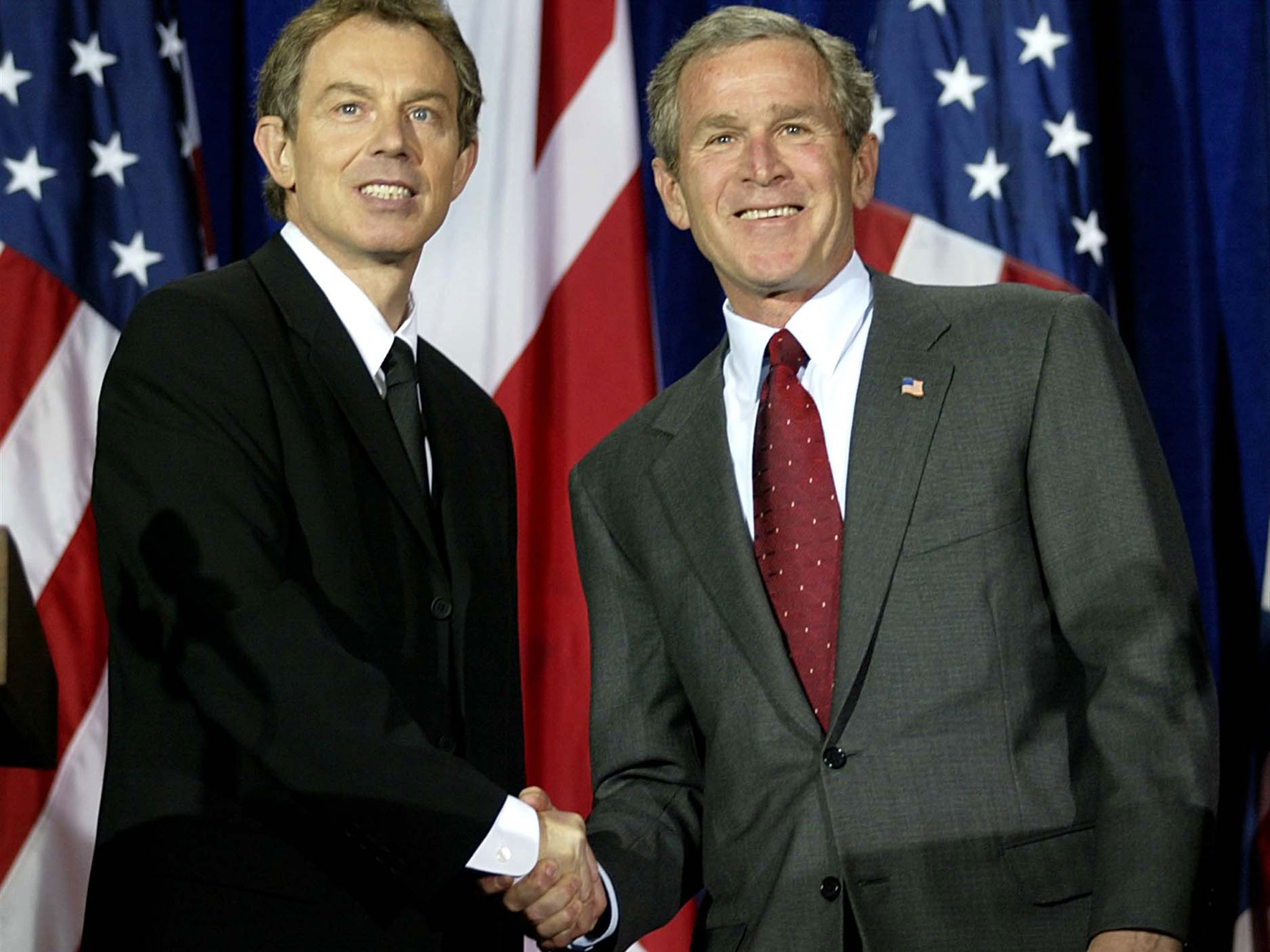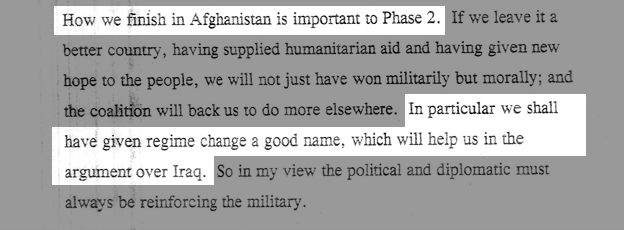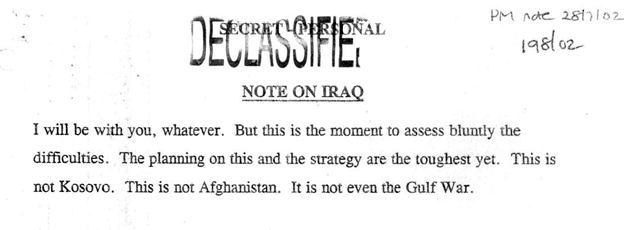Iraq War report: Key lines from the Blair-Bush memos

Memos sent by former UK Prime Minister Tony Blair to then US President George W Bush in the run-up to the Iraq War shine a light on the extent of the relationship between the two leaders.
The memos sent between 2001 and 2007 were released alongside Sir John Chilcot's report of his inquiry into the Iraq War.
line break
'We need to deal with Saddam'
Tony Blair to George Bush, 11 October 2001
"There is a real willingness in the Middle East to get Saddam out but a total opposition to mixing this up with the current operation [bombing Afghanistan]… I have no doubt that we need to deal with Saddam. But if we hit Iraq now, we would lose the Arab world, Russia, probably half the EU and my fear is the impact of all of that on Pakistan. However, I am sure we can devise a strategy for Saddam deliverable at a later date."
Mr Blair went on to say phase one had to be military action in Afghanistan where the perpetrators of 9/11 were hiding, then phase two would be the campaign against terrorism "in all its forms".
This memo reveals that Mr Blair and Mr Bush were openly discussing toppling Saddam Hussein as early as 2001, and just a month after the attacks on New York's Twin Towers.
line break
'Given regime change a good name'
Tony Blair to George Bush, 4 December 2001
Mr Blair suggested a strategy for regime change that builds over time was needed "until we get to the point where military action could be taken if necessary without losing international support".
"If toppling Saddam is a prime objective, it is far easier to do it with Syria or Iran in favour or acquiescing rather than hitting all three at once, I favour giving these two a chance at a different relationship…
And referencing involvement in Afghanistan, Mr Blair said if that gave new hope to people "in particular we shall have given regime change a good name which will help us in our argument over Iraq".
line break
'With you whatever'
Tony Blair to George Bush, 28 July 2002
"I will be with you, whatever…
Getting rid of Saddam is the right thing to do. He is a potential threat. He could be contained. But containment as we found with Al Qaida is always risky. His departure would free up the region. And his regime is probably, with the possible exception of North Korea, the most brutal and inhumane in the world.
The first question is: In removing him, do you want/need a coalition? The US could do it alone, with UK support. The danger is, as ever with these things, unintended consequences.
Suppose it got militarily tricky. Suppose Iraq suffered unexpected civilian casualties.
Suppose the Arab street finally erupted. Suppose Saddam felt sufficiently politically strong, if militarily weak in conventional terms, to let off WMD [weapons of mass destruction]. suppose that, without any coalition, the Iraqis feel ambivalent about being invaded and real Iraqis, not Saddam's special guard, decide to offer resistance.
If we win quickly, everyone will be our friend. If we don't and they haven't been bound in beforehand, recriminations will start fast."
This extract comes from the start of a six-page note, marked Secret Personal, to the US president, which was seen only by Number 10 officials before being sent, the report stated.
Neither then Foreign Secretary Jack Straw nor Defence Secretary Geoff Hoon were shown a copy in advance, and only Mr Straw got to see it afterwards.
Sir John said it was marked "personal" but it represented an extensive statement of the UK government's position eight months before the invasion, and both secretaries-of-state should have been given the chance to comment on it before it was sent.
line break
'Our best ally might be Russia'
Tony Blair to George Bush, 28 July 2002
"In my opinion, neither the Germans or the French, and most probably not the Italians or Spanish either, would support us without specific UN authority. And — and here is my real point — public opinion is public opinion. And opinion in the US is quite simply on a different planet from opinion here, in Europe or in the Arab world.
"In Britain, right now I couldn't be sure of support from Parliament, Party, public or even some of the Cabinet. And this is Britain. In Europe generally, people just don't have the same sense of urgency post 9/11 as people in the US… At the moment oddly, our best ally might be Russia."
Mr Blair told Mr Bush that if he wanted a wider military coalition he would have to get UN backing, make progress on Middle East peace and engineer a "shift" in public opinion. He acknowledged that there would be "reluctance" in the US about taking the issue to the UN Security Council, but insisted it was the best way to provide them with a legitimate case for military action.
line break
'Need to make the case'
Tony Blair to George Bush, 28 July 2002
In a paragraph entitled The Evidence, Blair writes: "Again, I have been told the US thinks this unnecessary. But we still need to make the case. If we recapitulate all the WMD evidence, add his attempts to secure nuclear capability, and as seems possible, add on Al Qaida link, it will be hugely persuasive over here. Plus, of course, the abhorrent nature of the regime."
Mr Blair emphasises the importance of presenting the evidence about Iraqi dictator Saddam Hussein's supposed weapons of mass destruction as well as trying to establish a link with al-Qaeda in the aftermath of 9/11 the previous year — although none was ever found.
Within two months of sending this note, Mr Blair told President Bush at a summit at Camp David, his country retreat, if it came to war, the UK would take a significant military role. This was despite no decision having been taken on which military package might be offered to the US for planning purposes.
line break
'Not when, but how'
Tony Blair to George Bush, 28 July 2002
"I would be happy to try to put all this together… But it needs a huge commitment in time and energy. So it's only really worth doing if we are all on the same page. On timing, we could start up after the (summer) break. A strike date could be Jan/Feb next year (2003). But the crucial issue is not when, but how."
'Risk Saddam messing us about'
Tony Blair to George Bush, 24 January 2003
What's the problem? If we delay, we risk Saddam messing us about, sucking us back into a game of hide and seek with the [UN] inspectors where, unless they find 'the smoking gun', the thing drags on forever until we give up or get distracted."
Mr Blair goes on to say that if former UN chief inspector Hans Blix finds "the smoking gun", "(and we are working very hard to get it for him), that is it and immediately the UN should discuss action".
line break
'Last mile for peace'
Tony Blair to George Bush, 19 February 2003
Outlining a course of action and a timeframe for putting down a second UN resolution, Mr Blair gives six reasons, the last one being: "It allows us to show the world we are going to war, not because we want to, but because we have to.
"Above all, it shows the US reaching out, understanding concerns, but still firmly willing to act. It sets the UN a fundamental test. It gives the Europeans something to rally round. When we do act, it will show we went the last mile for peace."
Политика конфиденциальности | Правила пользования сайтом













